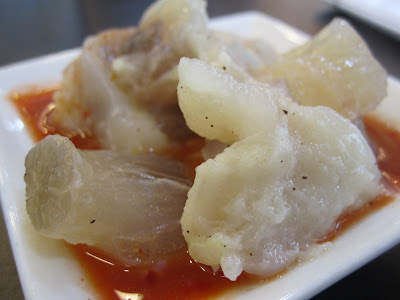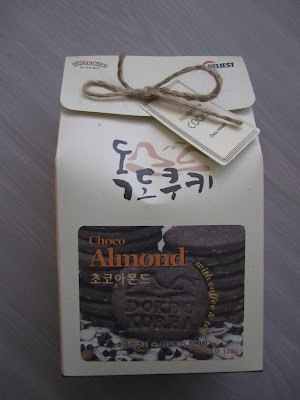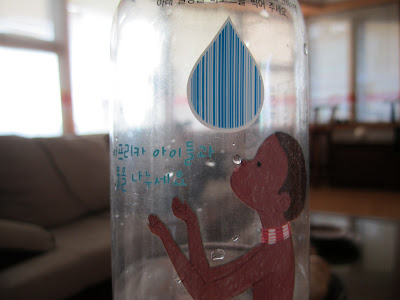Fixing the bashing machine : why I believe there is hope for France
To J.C. (a.k.a Papie Chat)
To J.C. (a.k.a Papie Chat)
 | ||
The McDo's green logo (Rouen city, France) - subversive yet sustainable
|
Back from a long journey throughout France that led me to Paris, Rouen (Normandy), Lons-le Saunier (Jura) and Carrières-sur-Seine (western Paris suburb), I have been trying unsuccessfully to return to my Korean routine. It has been almost two weeks since I reinstated my Seoul neighborhoods but I can't help thinking that I may not be in the right place at the right time. First, it seems I am still stuck in the French time zone in spite of my (mild) efforts to get back into business as usual. I must specify that my new status of independent worker has not helped me to adjust to the local sleeping schedule and so far, I have only managed to be in phase with my upstairs neighbors' baby. Secondly, not content with having lost my sleep and my bearings, it is possible that I have also lost my mind, as for the first time in my expatriate life, I am experiencing feelings of homesickness (meaning that I no longer feel home in Korea and that I miss France). More disturbing is the fact that my longing for my homeland comes at a time when it seems highly fashionable to ride the wave of French bashing.
While I completely understand that my country is in deep crisis (in deep shit, Mr. Clarke?), I also believe French bashing is an opportunity for us to stand up and stop whining to eventually start winning. It is actually encouraging to read /hear that we French are so disappointing since it can be easily interpreted as 'you can do better (as long as you give up the idea that you are misunderstood geniuses). In recent years, I have been often blamed by South Koreans for being 'so French', which usually implied I was either stubborn, individualistic, arrogant or even a 'French bitch' ... but the same people (and also many others, right?) also praised me for being creative, hard-working, sophisticated, smart or even crazy (I decided to take it as a compliment). I admit I have often been challenged by the local management style but in the end, I survived, and I probably improved myself (that which does not kill us makes us stronger). Although I complained a lot about intolerable situations such as the impossibility to exercise my right to (paid) vacations or my freedom to express my states of mind, I realized how privileged I was to have a job, three meals a day, hot water, etc.
In brief, I became optimistic, as hard as it may be for a French, and I just found out that people living in South Korea, expats included, were not happier than in France, but at least, they thought they were the best.
In brief, I became optimistic, as hard as it may be for a French, and I just found out that people living in South Korea, expats included, were not happier than in France, but at least, they thought they were the best.
In my humble opinion, French expatriates might be best positioned to defend the interests of their nation, being far enough from France to put things into perspective, and being French enough to feel sympathy and even empathy for the malaise of their compatriots. This year though, I was not particularly excited at the prospect of spending well-deserved vacations (a Korean oxymoron) on the basis of what I had recently heard or read about France (although I must concede that my mother and the media - Anglo-Saxons or French, are not the most objective information sources). Having just finished the final chapter of 'The Devil Ajumma wears Crocodile Ladies', a Korean version of Stupeur et Tremblements, I was more eager to celebrate my new freedom in wonderland rather than going from Charybdis to Scylla (or from bad to worse, if you prefer).
On the other hand, France appeared as an ideal destination to prevent any guilt trip as it would allow me to combine the useful with the pleasant. With the main purpose of visiting family and friends, I was determined to stay active in the tourism business by collecting first-hand information on France that could be used either in the process of building the France brand strategy, or in the framework of the Assises Nationales du Tourisme (or the National Conference on Tourism). For this, I would try to act as a responsible tourist who tries not to get influenced by clichés and preconceived ideas, and I then I would take the opportunity to read books and articles written by foreigners about France (see list below).
On the other hand, France appeared as an ideal destination to prevent any guilt trip as it would allow me to combine the useful with the pleasant. With the main purpose of visiting family and friends, I was determined to stay active in the tourism business by collecting first-hand information on France that could be used either in the process of building the France brand strategy, or in the framework of the Assises Nationales du Tourisme (or the National Conference on Tourism). For this, I would try to act as a responsible tourist who tries not to get influenced by clichés and preconceived ideas, and I then I would take the opportunity to read books and articles written by foreigners about France (see list below).
After weeks of intense research, I came to the conclusion that nothing was completely rotten in the state of France. In fact, most people criticizing France (or more exactly, bashing French people, since the same criticizers have highly contributed to make France the world’s leading tourist destination) are just demonstrating an obvious lack of manners, education, maturity, originality and/or elegance. Moreover, I realized that most of my compatriots (I mean, the normal ones, which obviously excludes politicians and journalists) did not seem to care about the opinion of the international community, and particularly native English speakers. Some may call it arrogance or even je-m'en-foutisme ("laissez-faire, I don't care" attitude), I would rather refer to some typical French sayings : 'les chiens aboient, la caravane passe' (dogs are barking, the caravan goes on) - this one being from Turkey, or 'ne rien faire et laisser dire' (do nothing and let people talk) or 'laisser pisser le Mérinos' (let the merino pee), all of them meaning that you have to do what you have to do, regardless of negative comments.
So far, I had an epiphany (after I ate the king cake and got the trinket twice): who would not want to bet on the future of a country where freedom is a core value (and I can tell you how foreigners envy us for this capacity to say and do what we want)? A country where the McDonald's logo is green? A country where everything and its contrary may happen ... or not? In spite of the overwhelming wave of globalization fueled by the unflagging progress of social networks and new information and communication technologies, France still stands as an exception if not a paradox, breaking rules as easily as records. Just as an example, let's mention the French labor productivity, which remains one of the highest among OECD countries, in spite of an extravagant number of vacation days and strikes ... To know more about this, read the article ‘Le French-bashing’ misses the mark.
In conclusion, I would say that there is a real French way of doing things. Just look at how French people prepare, produce and consume their meals. Everything is so carefully designed, engineered and staged from the market to the plate. It's no wonder that the gastronomic meal of the French has been listed as Intangible Cultural Heritage by the UNESCO. We are what and (how) we eat ...
Below are some of the contemporary books I have recently read (in English), written by expats who lived or survived in France. I did not find all of them hilarious (truth hurts) but it is always good to see yourself through the not-so-objective eyes of foreigners. In my case, it may be a good source of inspiration for the soon-to-be-published "8 years in the Kimchi".
A Year in Merde, Merde Actually and many others merde-related productions by Stephen Clarke
Almost French: A New Life in Paris by Sarah Turnbull
My Life in France by Julia Child
French Impressions by John S. Littell
A Year in Provence by Peter Mayle
 |
| The New Year's eve victim: a chapon (castrated rooster) |
 |
| My first french meal (Paul bakery, Paris CDG Airport) |
 |
| Local products sold at the Rouen Tourism office: taste and diversity |
 |
| Selling salami delicacies in Rouen |
 |
| "Save a turkey!", a very funny advertisement to encourage the consumption of salmon |
 |
| French market in Paris |
 |
| Bakery in Paris |
 |
| No need to mention Eiffel tower, Paris |
 |
| Vs. Namsan Tower in Seoul |
 |
| Korean restaurant in Paris |
 |
| Paris subway, clean and empty: there is hope I told you |
 |
| Wine tourism in Jura region, something you will never find in Korea |
 |
| Parc des Bains in Lons-le-Saunier: a Korean garden designed by Korean artists Jihae Hwang and inaugurated in 2013 Check more here |














.JPG)


































